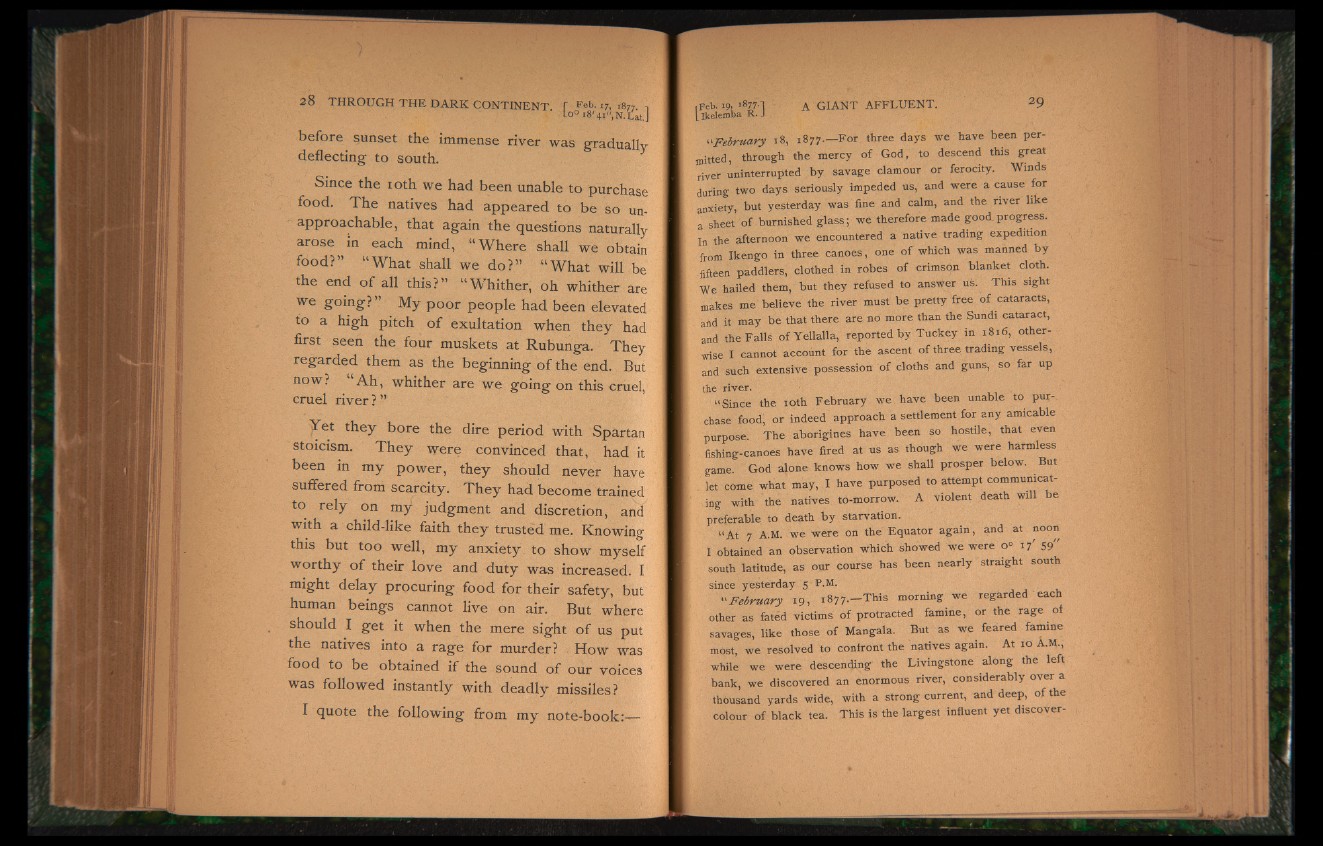
before sunset the immense river was gradually
deflecting to south.
Since the 10th we had been unable to purchase
food. The natives had appeared to be so unapproachable,
that again the questions naturally
arose in each mind, “Where shall we obtain
food?” “What shall we do?” “What will be
the end of all this?” “Whither, oh whither are
we going?” My poor people had been elevated
to a high pitch of exultation when they had
first seen the four muskets at Rubunga. They
regarded them as the beginning of the end. But
now? “ Ah, whither are we going on this cruel,
cruel river ? ”
Yet they bore the dire period with Spartan
stoicism. They were convinced that, had it
been in my power, they should never have
suffered from scarcity. They had become trained
to rely on my judgment and discretion, and
with a child-like faith they trusted me. Knowing
this but too well, my anxiety to show myself
worthy of their love and duty was increased. I
might delay procuring food for their safety, but
human beings cannot live on air. But where
should I get it when the mere sight of us put
the natives into a rage for murder? How was
food to be obtained if the sound of our voices
was followed instantly with deadly missiles?
I quote the following from my note-book:—
■ Feb. 19, 1877-1 A GIANT AFFLUENT.
[ Jkelemba R . J
uFebruary 18, 1877.— For three days we have been permitted,
through the mercy of God, to descend this great
river uninterrupted by savage clamour or ferocity. Winds
during two days seriously impeded us, and were a cause for
anxiety, but yesterday was fine and calm, and the river like
a sheet of burnished glass; we therefore made good.progress.
In the afternoon we encountered a native trading expedition
from Ikengo in three canoes , one o f which was manned by
fifteen paddlers, clothed in robes of crimson blanket cloth.
We hailed them, but they refused to answer us. This sight
makes me believe the river must be pretty free o f cataracts,
and it may be that there are no more than the Sundi cataract,
and the Fallé o fY ellalla, reported b y Tuckey in 1816, otherwise
I cannot account for the ascent of three trading vessels,
and such extensive possession of cloths and guns, so far up
the river.
“ Since the 10th February we have been unable to purchase
food, or indeed approach a settlement for any amicable
purpose. The aborigines have been so hostile, that even
fishing-canoes have fired at us as though we were harmless
game. God alone knows how we shall prosper below. But
let come what may, I have purposed to attempt communicating
with the natives to-morrow. A violent death will be
preferable to death b y starvation.
“ At 7 A.M. we were on the Equator again, and at nOon
I obtained an observation which showed we were 0° 17 59
south latitude, as our course has been nearly straight south
since yesterday 5 P.M.
“ February 19, . 1877-— This morning we regarded ' each
other as fated victims of protracted famine, or the rage of
savages, like those o f Mangala. But as we feared famine
most, we resolved to confront the natives again. At 10 A.M.,
while we were descending the Livingstone along the left
bank, we discovered an enormous river, considerably over a
thousand yards wide, with a strong current, and deep, of the
colour of black tea. This is the largest influent yet discover